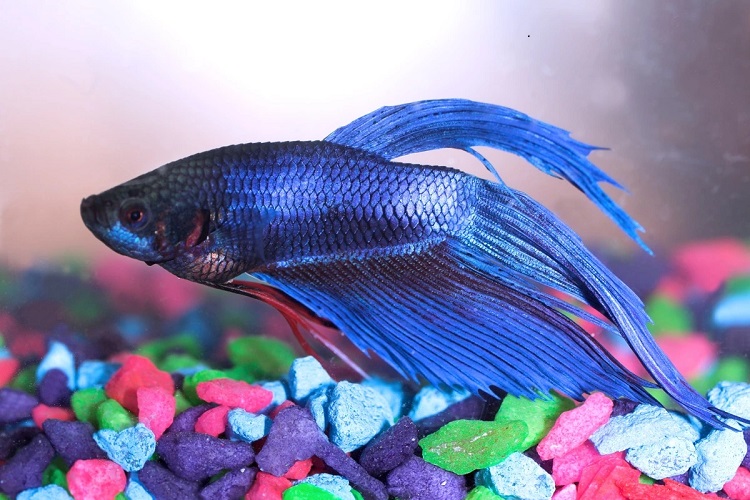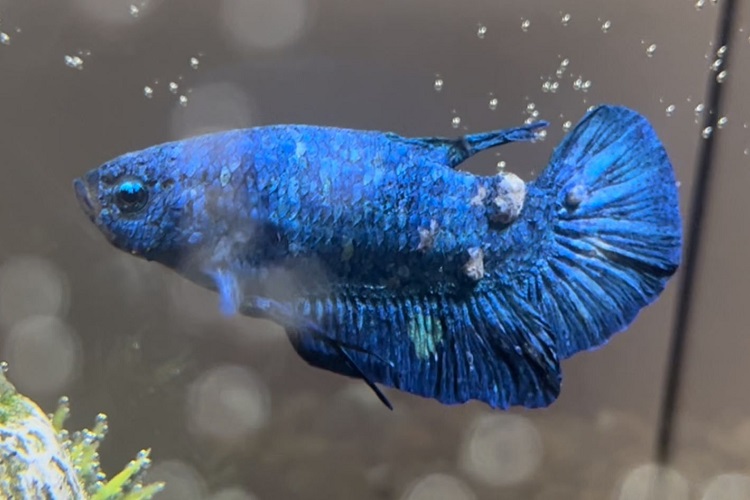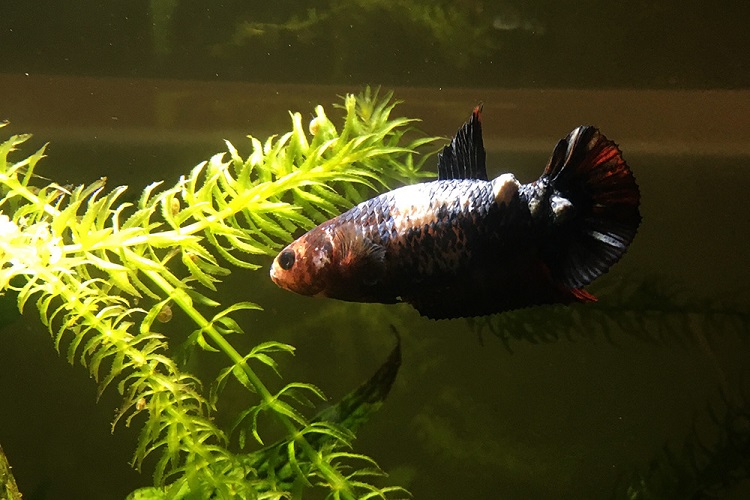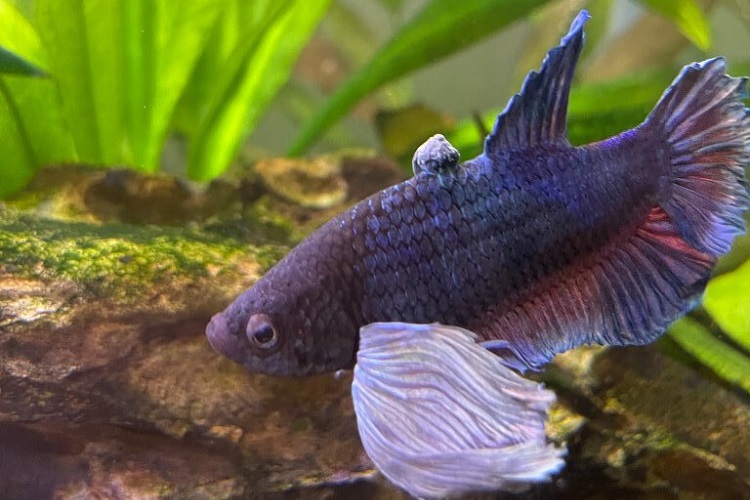Betta fish are stunning with their brilliant colors, flowy fins, and beautiful designs. So you’re understandably concerned if you notice a tumor-like growth starting to protrude from your betta’s body one day while watching them swim in their tank.
Here’s some good news: Not all betta tumors are cancerous, and it’s possible to treat some seemingly tumor-like bumps.
We’ll help you understand the must-knows of tumors in betta fish and the possibilities for treating and preventing them. Also, for optimal healthcare for your betta companion, check out these products:
Contents
Can Betta Fish Have a Tumor?

Yes, betta fish can have tumors. Betta tumors can grow anywhere on their bodies and be visible to the naked eye or hidden internally.
Cancerous tumors are rare in betta fish.
Nevertheless, bettas can develop several conditions that can cause them to look like they have dangerous growths. It’s possible to treat non-cancerous betta tumors in many cases.
What Is a Tumor Actually?
A betta fish tumor is a lumpy growth on the skin that is either external or internal. External tumors are the easiest for betta fish owners to identify, given that you can see them on the surface of your betta fish’s scales.
Internal tumors are often impossible to see, especially if they’re small. So, you’ll need to rely on observing your betta’s behaviors to determine if there’s something wrong with them.
Tumors range in sizes, from being so small you can barely see them with the naked eye to being so big that it’s as if your betta is growing another fish on them.
What Causes Tumors in Betta Fish?
Many factors can cause tumors in betta fish, including:
- Genetic predisposition
- Poor water parameters
- Low-quality diet
- Viral infections
Not all tumor growths are cancerous.
Instead, if your betta fish’s tumor has a white appearance, it could be a benign abscess or ulcer. Fungus infections can also create the appearance of cotton-like growths on your betta fish’s body.
How To Recognize a Betta Fish Tumor

It can sometimes be challenging to differentiate a betta fish tumor from another condition to the untrained eye. That’s because conditions like swim bladder disease, which can be the result of constipation or fluid retention, can all cause the body to take on the appearance of abnormal growths.
If you sense that your betta fish might have a tumor, below are the symptoms to look for, along with situations that might be false alarms.
What Are Betta Fish Tumor Symptoms?
The most common betta fish tumor symptom is seeing a physical growth on your betta’s body. Tumors can grow on any part of a betta fish.
In some cases, there might be a single growth. Other scenarios involve multiple tumors growing in separate locations or clumped together.
Aside from a round growth emerging from your betta’s body, other tumor symptoms include:
- Lethargy
- Inability to swim properly
- Lack of appetite
- Difficulty breathing
- Overall poor health appearance
Sometimes a tumor starts as a small, discolored spot. You may see a tumor growing directly on the scales or lifting the scales beneath your betta fish’s skin.
Use this product to treat and heal wounds, diseases and infections on your beloved betta
- Contains one (1) API BETTAFIX Antibacterial & Antifungal Betta Fish Infection and Fungus Remedy 1.7-Ounce Bottle
- Heals bacterial infections, repairing damaged fins, ulcers, and open wounds and promotes regrowth of fins
- Treats newly introduced fish to reduce risk of disease outbreak and heal wounds and tissue damage
How Likely Is It That a Tumor Will Grow On Your Betta Fish?
It isn’t typical for bettas to grow tumors. Instead, there’s usually another reason for your betta fish developing a tumor-like growth.
The rare event of a cancerous tumor in betta fish is often the result of genetics. Scientists also link contaminated water with carcinogens with the increased likelihood of fish developing cancer.
Since it’s unlikely your betta fish spent time in contaminated water before arriving at your home, you shouldn’t have to worry about your betta developing tumors from this external factor.
When Is a Lump Not a Tumor?

More often than not, a lump on your betta fish isn’t an indication of a tumor. Instead, your betta fish may have a non-cancerous growth in the form of an abscess, ulcer, or injury, among other reasons.
If the tumor on your betta fish is white, there’s a high chance it’s an abscess. Bacterial infections are the most common cause of abscesses, and several situations can instigate them, including:
- Physical injuries
- Aggressive fish
- Rubbing on sharp objects
If you keep your betta’s water clean and maintain their preferred water parameters, your fish will likely heal fine. But poor water quality, such as not changing your betta’s water frequently enough, and other less than ideal water conditions, can spark a bacterial infection in the wound.
If the white tumor-like lump has a spongy, porous appearance rather than being solid, you’re likely dealing with a case of fungus rather than a bacterial infection.
Ulcers
It’s common for betta owners to mistake ulcers for tumors. You can identify ulcers by looking for a red color on the growth. Eventually, an ulcer will erupt, opening the opportunity for a bacterial or fungal infection.
Gill Hyperplasia
Gill hyperplasia occurs when cells build up on your betta’s gills. While tumors can cause this, gill hyperplasia can also happen from physical trauma. The gills shrink when they heal, causing a build-up that can appear like a permanent tumor.
Parasites
Velvet disease results from a nasty parasite called Oodinium that burrows into a betta fish’s skin, leading to death if you don’t treat their water in time. The parasite tends to spark abscesses on a betta’s head. Columnaris is another disease that can create seemingly tumor head growths.
Dropsy
Dropsy is a specific kind of bacterial infection. It’s a severe condition that often results in a betta’s renal failure due to fluid building up in the kidneys.
Betta fish with dropsy often develop a curved spine. They become bloated, and their scales start to point out straight towards the end of their life, giving them an almost pinecone-like appearance.
Constipation
A severely constipated betta fish will have so much food backed up in their system that their sides will appear lumpy as if they have a tumor. That’s commonly the case if you feed your fish too much dry food. Betta fish eat more moisture-containing food in the wild, such as larvae and insects.
Swim Bladder Disease
Swim bladder disease is a general term for any condition impacting your betta fish’s ability to float. It can happen from constipation, gulping air, and eating too quickly. The result is an inflamed stomach that can make your betta fish look like it has a tumor.
Improve your betta’s health by replicating it’s natural habitat with:
- 【Double leaf design】: the bigger leaf approx. 2.36”x1.77”, the smaller leaf approx. 1.97”x1.50”,ideal for betta fish playing
- 【Strong sucker design】: you can easily put it into any place you like in the tank. Rinse the betta plant leaf with cool running water before use.Set of 2 pcs.
- 【High quality material】: Featherweight,durable and safe 、long lasting materials – Convenient and practical.The leaves will sway with the waves.
How To Treat a Tumor in a Betta Fish?

Sadly, there isn’t much you can do to treat a cancerous tumor in a betta fish.
If you live near a veterinarian with experience working with fish, they might be able to attempt surgery to remove the tumor. However, such a situation is uncomfortable for your fish, and the success rates are next to none.
As with humans, a tumor can also regrow. So, even if your veterinarian successfully removes the tumor and your betta fish recovers, there’s no guarantee that it will remain gone for good.
Betta fish only have a lifespan of two to five years, and tumor surgery is often expensive. So, most betta owners opt to keep their fish as comfortable as possible with their tumor in place for the duration of their life.
Treating Non-Cancerous Tumors
It’s essentially impossible to treat a cancerous tumor in a betta fish. But if your betta has a non-cancerous tumor due to a secondary ailment, there’s a good chance you might be able to help them fully recover.
Although the specific type of treatment can vary depending on the cause of the tumor-like growth on your betta, below are some general steps that can get your betta fish back to their healthy, happy self.
Step 1: Isolation
If your betta lives with other fish and you suspect they have something contagious, such as a fungus or parasite, move them to a quarantine tank. Make sure to use some of the water in the quarantine tank from their original tank to avoid shocking them.
Step 2: Check the Water Parameters
Whether your betta has a cancerous or non-cancerous tumor, they’ll benefit by living in a tank with ideal water conditions for their needs. The ideal water parameters for bettas include:
- pH: 6.5 – 7.5
- Ammonia: 0 ppm
- Nitrite: 0 ppm
- Nitrate: Less than 20 ppm
- Temperature: 75° – 81°F
Step 3: Medication
The type of medication you choose for your betta fish will depend on the condition causing their non-cancerous tumor. For example, you can purchase antibacterial or velvet disease medicine.
You’ll never have to hold your fish and put the medicine directly on their growth. Instead, you’ll add it to the water.
If you’re unsure about the cause of your betta’s tumor growth, using aquarium salt (not table salt) can help improve your fish’s overall health.
Step 4: Water Changes
Changing a portion of your betta’s water on a regular schedule is essential for their health.
But when treating them for a non-cancerous tumor condition, it’s often helpful to make 25% – 50% water changes daily. That’s especially the case if you’re treating a parasite, bacterial, or fungal infection.
Frequent water changes can help flush out the culprit for your betta’s poor health. We also recommend following the instructions on the medication, as you’ll likely need to add more medicine as you change the water to ensure your betta is getting a high enough concentration of it.
Feed your betta friend with nutritious and high quality food to prevent sickness with these top recommended betta food:
- BETTA FORMULATION Nutritionally complete daily diet for your Siamese fighting fish (betta splendens)
- COLOR-ENHANCING Includes carotenoids to enhance your betta’s naturally brilliant colors
- FLOATING PELLETS Ideally sized for top-feeding bettas
Can You Prevent Tumors in Betta Fish?

Although many cancerous tumors are genetic, there are some things you can do to reduce the chances of cancerous and non-cancerous tumors developing in your betta fish. They include:
- Using a filtration system
- Feeding a high-quality diet
- Changing 25% of the water each week
- Quarantining new fish
We also recommend purchasing your betta fish from a reliable breeder. Since it’s cheaper for people to breed the betta fish they have, many pet stores inbreed their stock.
So, make sure to check on your betta’s lineage before buying them, asking if they use a large genetic pool when breeding their fish.
New betta owners commonly make the mistake of not using proper cleaning techniques to care for their fish. That’s an understandable error, given that pet stores sell bettas in such tiny tanks without filters.
But transferring your betta to a new, larger tank when you arrive home and setting it up with a filter is crucial to helping them live a long life and reducing the chances of them developing a condition that can cause a tumor-like growth.
Euthanizing a Betta Fish With Tumors
It’s never an easy decision to put a betta fish to sleep. But it can be equally hard to watch your betta fish suffer in their tank from their tumors despite your best efforts to cure them.
If this is the case, two of the most humane ways to euthanize your betta fish include adding clove oil or baking soda to their water.
Should you choose the clove oil route, you’ll need to mix three drops of the oil into a large bowl of warm water. Your betta fish will fall to the bottom of the tank shortly after you place them in it. At that point, add five more drops of clove oil.
Alternatively, you can stir three tablespoons of baking soda into a gallon of water.
Clove oil is generally the most humane way to put a betta fish to sleep, so we encourage you to opt for that route. But regardless of the method you choose, ensure that their gills stop moving before you transfer your fish to their final resting place.
Conclusion
A betta fish with tumors doesn’t necessarily mean a death sentence. Instead, there are many treatable reasons your betta might have growths on their scales or inside their bodies.
That said, even non-cancerous tumors can develop too quickly for treatment to be effective. So, if you’ve tried the treatment methods we discussed here, and your betta appears to be in visible pain, the most humane thing to do might be to put them to sleep.
Remember to acquire these products for optimal care for your betta fish:

Ian Sterling, founder of Fishlab.com, began his aquarium journey over 30 years ago, driven by a deep fascination for fish and their diverse personalities. His website, Fishlab.com, is dedicated to making fishkeeping accessible and enjoyable, offering beginner-friendly guidance, expert insights, and a community for aquarists to connect and share experiences.








